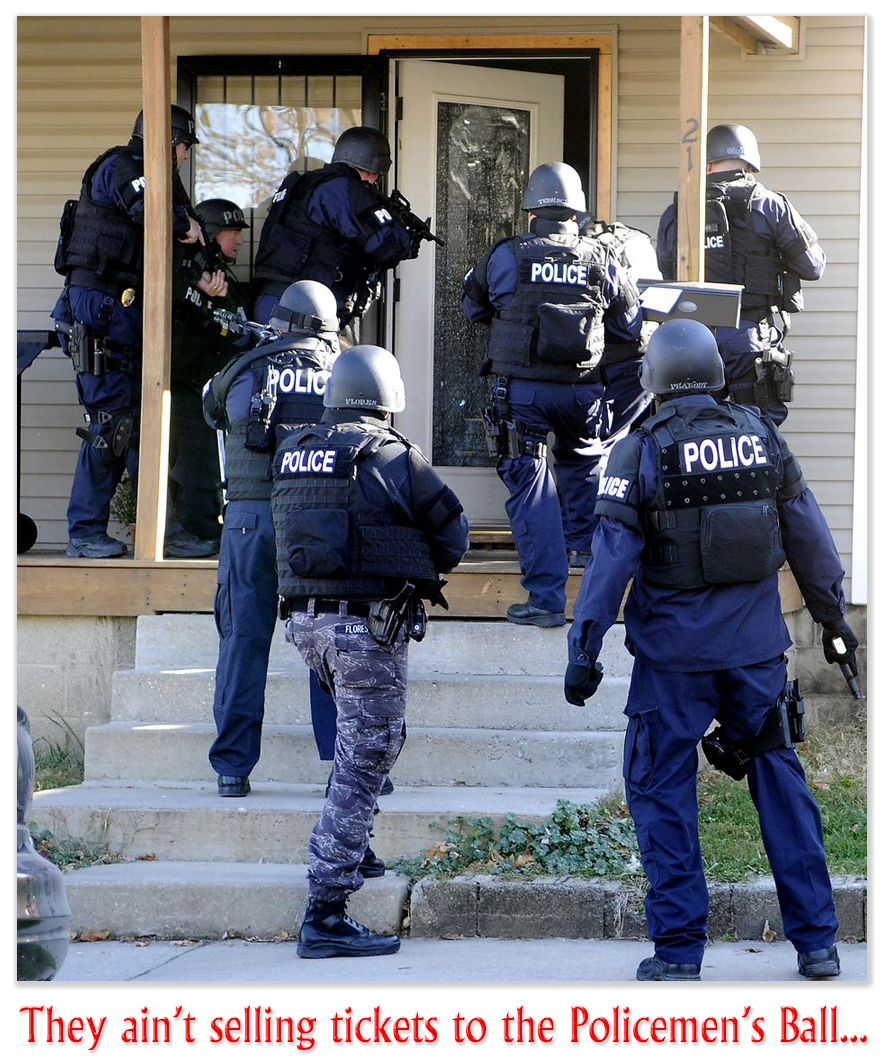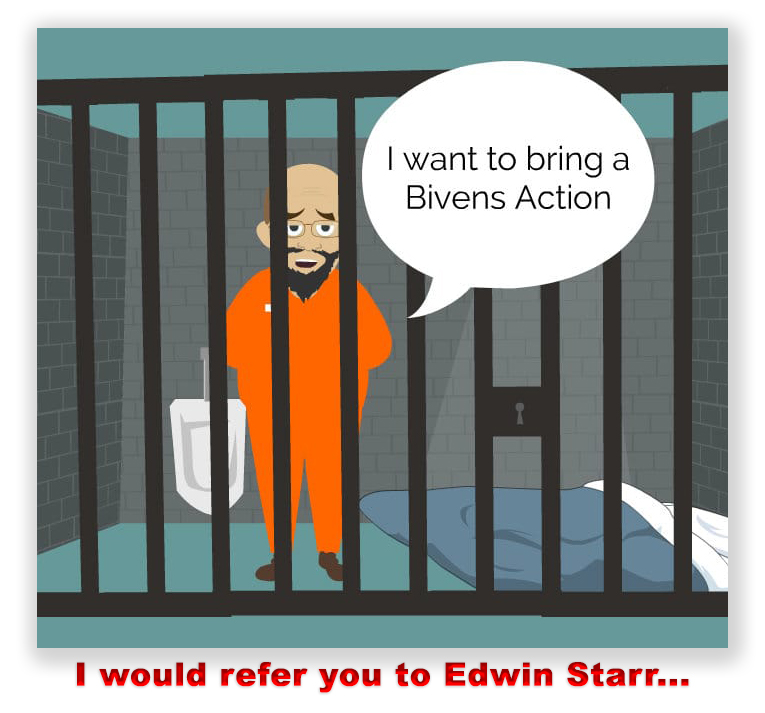We post news and comment on federal criminal justice issues, focused primarily on trial and post-conviction matters, legislative initiatives, and sentencing issues.

BIVENS – KILLING IT SOFTLY
I was just graduating from high school when the Supreme Court ruled in favor of Webster Bivens, who sued federal agents after they broke into his apartment without a warrant and arrested him on a drug charge (that was promptly dismissed by a magistrate judge).
 In the 50-year-plus interlude since I turned 18, Webb Biven’s handwritten lawsuit seeking monetary damages against the agents who kicked down his door became famous in legal circles as Bivens v. Six Unknown Named Agents of Federal Bureau of Narcotics. Webb has quite accidentally lent his name to all lawsuits seeking money for federal officials’ and agents’ misconduct, widely known as “Bivens actions.”
In the 50-year-plus interlude since I turned 18, Webb Biven’s handwritten lawsuit seeking monetary damages against the agents who kicked down his door became famous in legal circles as Bivens v. Six Unknown Named Agents of Federal Bureau of Narcotics. Webb has quite accidentally lent his name to all lawsuits seeking money for federal officials’ and agents’ misconduct, widely known as “Bivens actions.”
I now carry a Medicare card. The high school from which I graduated no longer exists. And when reading this week’s 3rd Circuit’s decision in Kalu v. Spaulding, I keep recalling Edwin Starr’s 1969 piece War, albeit with different lyrics:
Bivens, uh-huh, what is it good for?
Absolutely nuthin’.
Say it again, y’all.
Or maybe Roberta Flack: Bivens – Killing It Softly.
Congress has authorized federal money-damages lawsuits against state and local officials and employees for the violation of one’s constitutional rights in 42 USC § 1983. When Webb argued in 1971 that there must exist a similar right to sue federal officials and employees for damages when they run roughshod over a person’s constitutional rights, the Supreme Court obliged him, finding in the Constitution an implied right to do to federal officials what § 1983 lets one do to state and local officials.
In the decade following the Bivens decision — which authorized suits seeking damages for 4th Amendment violations — the Supreme Court approved a Bivens damage remedy for a congressional staffer’s gender discrimination claim under the 5th Amendment (Davis v. Passman) and for a federal prisoner’s inadequate-care claim under the 8th Amendment (Carlson v. Green).
However, 1980 was the high-water mark for Bivens. Since then, citing the Constitution’s separation of legislative and judicial power, SCOTUS has consistently narrowed the grounds that can support a Bivens actions.
“At bottom,” the Supremes said two years ago in Egbert v. Boule, a decision that drove a stake through the heart of Bivens, “creating a cause of action is a legislative endeavor.” Thus, litigants are denied the right to bring a Bivens action in “a new context.”
 If it ain’t a 4th Amendment “kick-down-the-door” suit, a member of Congress with wandering hands, or an 8th Amendment inadequate care claim, Bivens is good for absolutely nuthin’.
If it ain’t a 4th Amendment “kick-down-the-door” suit, a member of Congress with wandering hands, or an 8th Amendment inadequate care claim, Bivens is good for absolutely nuthin’.
This week, the 3rd Circuit demonstrated in a lengthy opinion just how dead Bivens is, making the casual reader wonder why the Supreme Court — which is not adverse to the death penalty — didn’t simply consign Bivens to the dustbin of history the way it did Roe v. Wade (another relic of my youth).
John Kalu, who was a federal inmate at the time, brought an 8th Amendment claim against a Bureau of Prisons correctional officer for sexually assaulting him on three occasions. John has since been released and thus has no remedy for the alleged offense except money damages. However, the Circuit held, “[h]eeding the Supreme Court’s recent and repeated warning that we must exercise ‘caution”’ before implying a damages remedy under the Constitution, we decline to extend the Bivens remedy to Kalu’s claims.”
The 3rd admitted that John’s Bivens claim for sexual assault was pretty close to the Carlson situation, where the Court allowed a Bivens action for the BOP’s failure to protect a prisoner from a sexual assault by another prisoner. But while admitting that “the distinctions between Kalu’s sexual assault claim and the one recognized in Carlson are perhaps small, at least in practical terms… given the Supreme Court’s expressed caution about extending the Bivens remedy, the new-context inquiry is easily satisfied here.”
The Circuit ruled that
the availability of an alternative remedial scheme through the BOP’s administrative remedy program, Congress’s repeated omission of a cause of action against individual officials in both the Prison Litigation Reform Act and the Prison Rape Elimination Act, and separation of powers principles are special factors counseling against extending Bivens liability to Kalu’s officer-on-prisoner sexual assault claim. As Egbert cautions, whether to supplement an existing remedial scheme with a damages action is a legislative determination that we are not allowed to ‘second-guess…’ We therefore hold Kalu’s 8th Amendment sexual assault claim… is ineligible for remedies under Bivens.
In Egbert, the Supreme Court indicated that if it had to decide Bivens today, it “would decline to discover any implied causes of action in the Constitution.” One wonders why the Supreme Court didn’t simply overturn Bivens, stare decisis be damned, and spare the judicial system and plaintiffs the steady drip inevitably leading to limiting Bivens to a meaningless singularity.
 One of the unanimous three-judge panel in Kalu was Judge Luis Restrepo, who also serves on the US Sentencing Commission. Although Judge Restrepo felt that Egbert required that he join the majority opinion, he wrote a concurring opinion delivering a blistering criticism of “the alarming reports of pervasive staff-on-inmate sexual abuse within the Bureau of Prisons and corresponding flaws in the administrative remedy process.”
One of the unanimous three-judge panel in Kalu was Judge Luis Restrepo, who also serves on the US Sentencing Commission. Although Judge Restrepo felt that Egbert required that he join the majority opinion, he wrote a concurring opinion delivering a blistering criticism of “the alarming reports of pervasive staff-on-inmate sexual abuse within the Bureau of Prisons and corresponding flaws in the administrative remedy process.”
Judge Restrepo noted that while the “Federal Prison Oversight Act, which President Joe Biden recently signed into law… provides much-needed safeguards, the provision of a civil legal remedy for survivors of staff-on-inmate abuse is notably absent from the text of the statute. This absence, Egbert cautions us, may lend ‘reason to think Congress might doubt the efficacy or necessity of a damages remedy’ in cases such as the one before us’.”
Uh-huh.
Bivens v. Six Unknown Named Agents of Federal Bureau of Narcotics, 403 US 388 (1971)
Egbert v. Boule, 596 US 482 (2022)
Davis v. Passman, 442 US 228 (1979)
Carlson v. Green, 446 U.S. 14 (1980)
Kalu v. Spaulding, Case No. 23-1103, 2024 U.S. App. LEXIS 21092 (3d Cir. Aug. 21, 2024)
– Thomas L. Root

